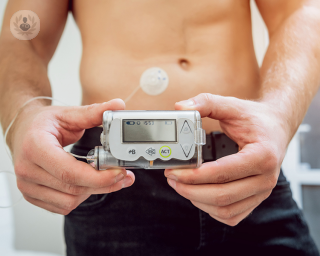What is an insulin pump?
An insulin pump is a treatment implemented by a mechanical and electrical device that ensures 24/7, fast-acting insulin administration to people who have type 1 or type 2 diabetes.
The device works by releasing a given amount of insulin subcutaneously (underneath the skin) and continuously. It is small and portable.

What is an insulin pump for?
Insulin pumps are prescribed to people who need constant insulin administration, offering a great help for those who have to live with diabetes. It can ensure a much-improved quality of life, as a result of properly managed diabetes.
How does an insulin pump work?
The insulin pump is as big as a small mobile phone. It is equipped with a processing module, linked to the insulin reservoir. The pump is placed on the abdominal area or on the buttocks; it is linked to the subcutaneous tissue with a small cannula. It then releases a minimal and continuous amount of insulin (as close as possible to your real needs), with variable speed during the different phases of the day.
During the night, different amounts of insulin are released as you are asleep and not eating meals. If you eat, you can press a button on the pump to give an additional boost of insulin – this is called a bolus and can meet the needs to eating a larger meal than average, for example. You can also take a bolus if your blood glucose levels are high.
How can I ensure that an insulin pump is effective?
Having an insulin pump, however, does still require frequent measurement of your blood glucose levels.
The following criteria are generally recommended for ideal insulin pump candidates:
- Having a good understanding of your diabetes.
- Being prepared to measure blood glucose levels throughout the day.
- Understanding the impacts of exercise and diet on your blood glucose levels.
- Willing to wear the device at all times.
Are there disadvantages of having an insulin pump?
There are some points to consider when using an insulin pump to treat your diabetes. These include:
Getting used to the device
Things like changing infusion sets, which can be a longer process than taking a single injection, setting basal rates and avoiding issues such as bubbles take some time to figure out.
Frequent blood glucose testing
As mentioned above, frequent blood glucose testing of at least 4 times a day is still required if you have an insulin pump.
Diabetic ketoacidosis (DKA) risk
Problems like getting air in the tubing, or having a blocked cannula, can develop. This means you may not get enough insulin, and this could lead to ketone rising. In turn, this could lead to an increased risk of ketoacidosis.
Skin infections
There is a risk of skin infections occurring because insulin pumps involve having a catheter implanted under the skin for a number of days. Thankfully, they should be rare as long as correct procedures are followed.
Catching the tubing on objects
This can be an issue especially if longer lengths of tubing are used. It's potentially painful and can leave the infusion site sore for some time.
07-07-2016 08-31-2023Insulin pump
Dr James Greening - Paediatric endocrinology, diabetes & metabolism
Created on: 07-07-2016
Updated on: 08-31-2023
Edited by: Karolyn Judge
What is an insulin pump?
An insulin pump is a treatment implemented by a mechanical and electrical device that ensures 24/7, fast-acting insulin administration to people who have type 1 or type 2 diabetes.
The device works by releasing a given amount of insulin subcutaneously (underneath the skin) and continuously. It is small and portable.

What is an insulin pump for?
Insulin pumps are prescribed to people who need constant insulin administration, offering a great help for those who have to live with diabetes. It can ensure a much-improved quality of life, as a result of properly managed diabetes.
How does an insulin pump work?
The insulin pump is as big as a small mobile phone. It is equipped with a processing module, linked to the insulin reservoir. The pump is placed on the abdominal area or on the buttocks; it is linked to the subcutaneous tissue with a small cannula. It then releases a minimal and continuous amount of insulin (as close as possible to your real needs), with variable speed during the different phases of the day.
During the night, different amounts of insulin are released as you are asleep and not eating meals. If you eat, you can press a button on the pump to give an additional boost of insulin – this is called a bolus and can meet the needs to eating a larger meal than average, for example. You can also take a bolus if your blood glucose levels are high.
How can I ensure that an insulin pump is effective?
Having an insulin pump, however, does still require frequent measurement of your blood glucose levels.
The following criteria are generally recommended for ideal insulin pump candidates:
- Having a good understanding of your diabetes.
- Being prepared to measure blood glucose levels throughout the day.
- Understanding the impacts of exercise and diet on your blood glucose levels.
- Willing to wear the device at all times.
Are there disadvantages of having an insulin pump?
There are some points to consider when using an insulin pump to treat your diabetes. These include:
Getting used to the device
Things like changing infusion sets, which can be a longer process than taking a single injection, setting basal rates and avoiding issues such as bubbles take some time to figure out.
Frequent blood glucose testing
As mentioned above, frequent blood glucose testing of at least 4 times a day is still required if you have an insulin pump.
Diabetic ketoacidosis (DKA) risk
Problems like getting air in the tubing, or having a blocked cannula, can develop. This means you may not get enough insulin, and this could lead to ketone rising. In turn, this could lead to an increased risk of ketoacidosis.
Skin infections
There is a risk of skin infections occurring because insulin pumps involve having a catheter implanted under the skin for a number of days. Thankfully, they should be rare as long as correct procedures are followed.
Catching the tubing on objects
This can be an issue especially if longer lengths of tubing are used. It's potentially painful and can leave the infusion site sore for some time.


Insight on the closed-loop insulin pump: Key advantages and drawbacks
By Dr Natasha Patel
2024-12-14
The closed-loop insulin pump, also known as an artificial pancreas, is improving quality of life for many people living with diabetes. We learn more about the advantages and drawbacks of this innovative diabetes management system from highly respected consultant diabetologist Dr Natasha Patel. See more


Is an insulin pump better than injections?
By Dr Rasha Mukhtar
2024-12-13
Which is better for managing blood sugar control with diabetes: insulin injections or the insulin pump? Leading consultant in diabetes and endocrinology, Dr Rasha Mukhtar, tells you everything you need to know about the insulin pump and if it’s right for you. See more


The difference between type 1 and type 2 diabetes: Causes, diagnosis and treatment
By Dr Dulmini Kariyawasam
2024-12-13
Diabetes is a chronic condition, and it affects the body’s ability to regulate blood sugar (glucose). There are two main types of diabetes, type 1 and type 2. They differ in what causes them, their development, and treatment. Understanding these differences is crucial for proper management and care. See more


What are the advantages of hybrid closed loop insulin pumps?
By Dr Natasha Patel
2024-12-11
Living with diabetes necessitates constant vigilance and meticulous management to ensure a healthy and fulfilling life. Over time, advancements in medical technology have introduced innovative solutions to simplify and enhance this management process. One notable advancement is the hybrid closed loop insulin pump, commonly known as an artificial pancreas. In this article, leading consultant diabetologist Dr Natash Patel delves into the advantages and disadvantages of this groundbreaking device, helping you make an informed decision regarding its suitability for yourself or your loved ones. See more
Experts in Insulin pump
-
Dr Rasha Mukhtar
Endocrinology, diabetes & metabolismExpert in:
- Diabetes
- Insulin pump
- Thyroid disorders
- Adrenal gland disorders
- Gestational diabetes
- Weight loss
-
Dr James Greening
Paediatric endocrinology, diabetes & metabolismExpert in:
- Paediatrics
- Diabetes
- Childhood obesity
- Thyroid disorders
- Adrenal gland disorders
- Insulin pump
-
Dr Richard Sheaves
Endocrinology, diabetes & metabolismExpert in:
- Thyroid disorders
- Adrenal gland disorders
- Neuroendocrine tumours
- Insulin pump
- Diabetes
- Diseases of the pituitary and hypothalamus
-
Dr Sheharyar Qureshi
Endocrinology, diabetes & metabolismExpert in:
- Diabetes
- Infertility
- Insulin pump
- Thyroid disorders
- Neuroendocrine tumours
- Diseases of the pituitary and hypothalamus
-
Dr Shanthi Chandran
Endocrinology, diabetes & metabolismExpert in:
- Diabetes
- Gestational diabetes
- Insulin pump
- Thyroid
- Parathyroid gland
- Adrenal gland disorders
- See all

Private Care at Chelsea and Westminster Hospital
Private Care at Chelsea and Westminster Hospital
Chelsea and Westminster Hospital, 369 Fulham Rd.
No existe teléfono en el centro.
By using the telephone number provided by TOP DOCTORS, you automatically agree to let us use your phone number for statistical and commercial purposes. For further information, read our Privacy Policy
Top Doctors

The Parkside Suite Frimley
The Parkside Suite Frimley
Frimley Park Hospital, Portsmouth Road, GU16 7UJ
No existe teléfono en el centro.
By using the telephone number provided by TOP DOCTORS, you automatically agree to let us use your phone number for statistical and commercial purposes. For further information, read our Privacy Policy
Top Doctors

West Middlesex Hospital - Private Care
West Middlesex Hospital - Private Care
Twickenham Road, Isleworth, TW7 6AF
No existe teléfono en el centro.
By using the telephone number provided by TOP DOCTORS, you automatically agree to let us use your phone number for statistical and commercial purposes. For further information, read our Privacy Policy
Top Doctors
-
Private Care at Chelsea and Westminster Hospital
Chelsea and Westminster Hospital, 369 Fulham Rd., Central LondonExpert in:
- General Surgery
- Dermatology
- Paediatric Dermatology
- Paediatrics
- Preventive paediatrics
- Adult and paediatric services
-
The Parkside Suite Frimley
Frimley Park Hospital, Portsmouth Road, GU16 7UJ, CamberleyExpert in:
- Cardiology
- Orthopaedic surgery
- Breast augmentation
- Dermatology
- Endocrinology
- Gastroenterology
- See all
- Most viewed diseases, medical tests, and treatments
- Hormone therapy
- Autoimmune diseases
- Nutrition
- Preconception care
- Osteoporosis
- Long Covid
- DEXA scan
- Stress
- Thyroid disorders
- Anti-ageing treatments







